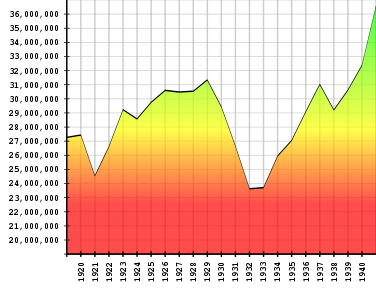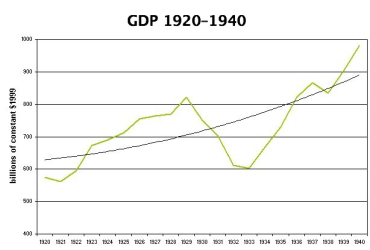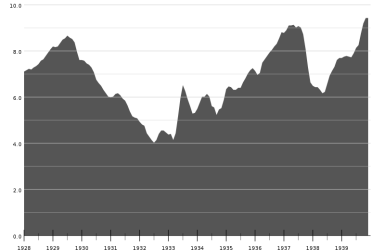With talk of federal spending to help the economic recovery, it's become a right-wing talking point that FDR's New Deal didn't work.
Like most talking points from right-wing pundits these days, it's a bunch of malarkey.
Employment began to recover in FDR's first term. By 1937, the labor force had reached just short of the boom's 1929 peak. In 1937, conservative opposition slowed New Deal projects - and employment fell again, though not as steeply. Opposition ebbed, the New Deal was strengthened, and employment recovered to higher than 1929 levels - and was trending still higher - by 1940, before the U.S. entry into WWII. (Note this chart shows non-farm, non-WPA employment.)
The same pattern can be seen in GDP and in industrial production - a turn-around from sharp decline to sharp rise when the New Deal was implemented, a fall-off at the start of FDR's second term when opposition slowed it, but a still a full recovery before WWII.
GDP (constant dollars) was higher in 1937, and in every subsequent year, that it was in 1929 - an argument can be made that the Depression ended in 1937, and was followed by a milder recession brought on by the slowing of New Deal projects.
Now, the New Deal wasn't magic; it couldn't instantly fix an economic instability caused by years of speculative capitalism, plus a declining agricultural export market (as Europe recovered from WWI) along with a decrease in farm employment from increased mechanization - not to mention the effects of the Dust Bowl. But the numbers clearly show that the New Deal did a lot of good for the economy.



Peter Lunicks (not verified)
Fri, 12/19/2008 - 22:41
Permalink
did the New Deal work?
A few points that might help you understand the illusion that the New Deal "worked":
First, government spending -- and false credit in general -- creates artificial booms. These booms necessarily (this is what is meant by the term 'economic law') must collapse into a bust. The history of the last 150-200 years -- since the advent of the central bank -- can be charted in terms of these booms and busts. This fact is especially evident in the current crisis, the result of excessive creation of money and irresponsible lending, brought on largely by government requirements and government-imposed incentives to irresponsible and unsound economic actions.
Second, no, employment didn't really recover under Roosevelt. The official figures of unemployment, of course, include people employed by government make-work spending programs; hence, that they are not an accurate measure of the true, long-term, meaningful recovery of the economy per se. They are an illusion, a temporary boom created by irresponsible spending -- and the bubble popped. The economy, including unemployment, was worse in 1938 than at any other time since the Depression began.
No, it wasn't the New Deal that ended the Great Depression, nor was it the War. It was the end of the war. Yes, there were periods from 1932-1944 where some of the symptoms of the Depression were diminished, but the Depression did not truly end until the War ended. Does treating the symptoms of a disease cure the disease? No, but it can create the impression that the disease is improving, even if it's not. If not because of the New Deal, and not because of the War, why did the Depression end? During the war, the greater part of government spending was diverted from domestic make-work projects was diverted toward war spending. This in itself did not end the Depression -- rather, it prolonged it. The War, however, unlike the New Deal, had a real end in sight -- victory was defined and was eventually achieved. With victory, military spending of course was lessened, and most of the New Deal programs were not brought back. The end of these programs freed up an enormous amount of private capital for private investment, business, individual investment, etc., allowing the market to recover and putting the Depression behind us.
Tom Swiss
Sat, 12/20/2008 - 10:27
Permalink
In reply to did the New Deal work? by Peter Lunicks (not verified)
economic diseases and symptoms
Unemployment and economic stagnation are not just "symptoms", they are the disease itself.
As I pointed out, the employment figures charted above are non-farm, non-WPA employment. So they do not include those "employed by government make-work spending programs". (Not that constructing public roads, buildings, and utilities should be considered "make-work".)
And the boom and bust caused by government spending is no more "artificial" than that caused by speculators running hot or cold. The cycle is inherent in capitalism; the New Deal saved capitalism from itself.
If you want to get rid of that cycle, we need to end capitalism. As a libertarian socialist I'm all in favor of that - but it needs to be a slow process of building a better way. A sudden collapse of a socioeconomic system is more likely to lead to tyranny than to liberty, as desperate people turn to strongmen to "restore order" and the like.
Tom Swiss - proprietor, unreasonable.org
San Diego pers… (not verified)
Thu, 01/15/2009 - 19:44
Permalink
One of the things that
One of the things that frustrates the heck out of me with economics is that you can never prove what caused what. This means that for any controversial economic measure, one side will argue it worked, and the other will argue it didn't work, and because neither can prove it, you're left with conflicting experts. What's a guy to do at that point?
Anonymous (not verified)
Wed, 03/11/2009 - 03:47
Permalink
Obama's economic adviser says no
"According to economists Christina Romer—chief of Obama's Council of Economic Advisers—and David Romer, New Deal spending did not pull the economy out of recession. In a 1992 "Journal of Economic History" paper, the Romers examined the role that aggregate demand stimulus played in ending the Great Depression. They concluded: A simple calculation indicates that nearly all of the observed recovery of the U.S. economy prior to 1942 was due to monetary expansion." —"Stimulating Ourselves to Death: They might sound great, but do stimulus packages work?" Veronique de Rug, Reason, April, 2009
Bret (not verified)
Sat, 07/21/2012 - 10:51
Permalink
The real question is why does
The real question is why does the government feel it has to do something if all is well? Obviously when something is wrong and the saying it can only, one day, in the distant future, get better [fingers crossed]. But people are homeless, jobless and foodless. Whatever a government does it can't please everybody. But in this case it pleased and helped a lot more people than just sitting by hoping that economic theory will work out eventually regardless of the hardships for the average Joe.